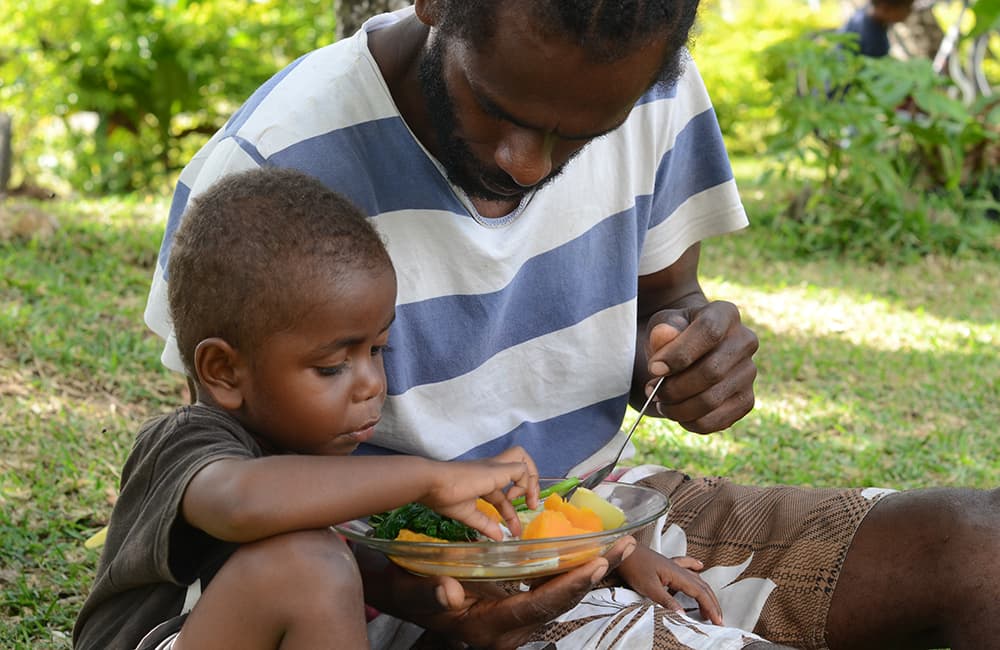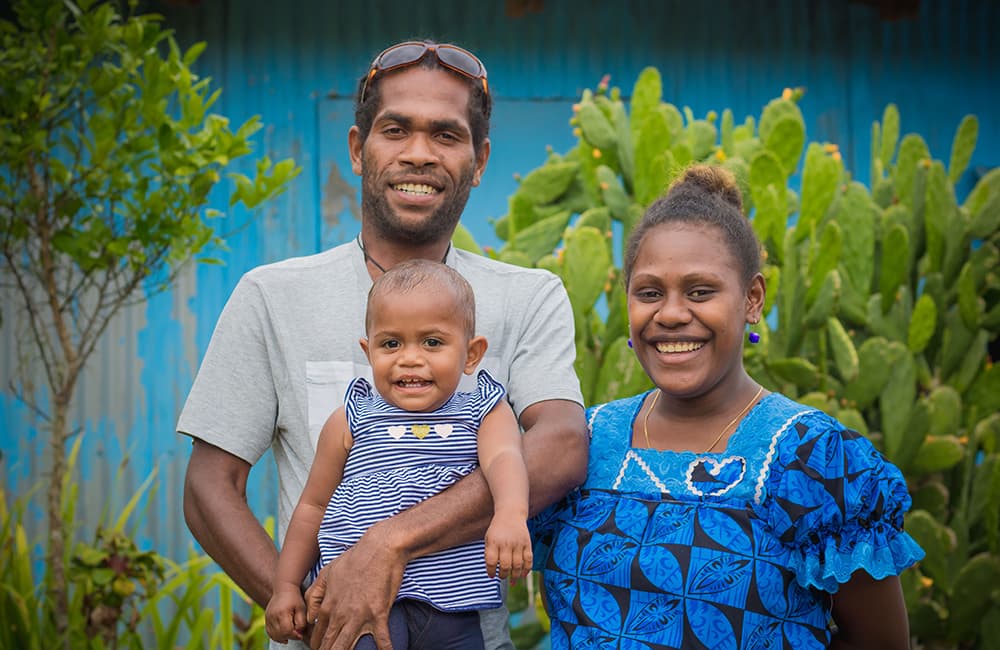In Vanuatu dads are breaking tradition to help raise children
In a tiny village in Shefa Province, big changes are happening. With the support of our First 1000 Days program, fathers are breaking traditional stereotypes to take the lead on raising their young children.
Parenting in Paradise
Protected by the calm lagoon waters off the Northern Coast of Efate, and flanked by thick jungle to the south, this traditional Ni-Vanuatu village is a veritable tropical paradise. The families who live here — 60 km from Vanuatu’s bustling capital, Port Vila — make the most of the rich volcanic soil and prolific reef ecosystem, fishing and farming to earn a living.
Growing up in a tropical paradise might seem like the makings of an ideal childhood, yet in Vanuatu, an estimated 29% of children under five are stunted1 — a form of undernutrition that restricts their physical and mental development. Stunting has become a significant issue across communities in the Pacific for a number of reasons; including imbalanced diets, availability of affordable and healthy foods, and lack of access to food sources due to the devastating impacts of climate change. But with the right tools and knowledge, stunting can be prevented. By improving the nutrition of both mothers and their children in the first 1000 days of life – from conception to two years of age; kids are able to thrive, rather than just survive.
Call me Ismael
Meet Ismael — a young leader in his village, a father to a young daughter and family man awaiting the birth of his second child. Ismael, and his wife Amanda, are participants in the First 1000 Days program facilitated by Save the Children.
The First 1000 Days program works to provide mothers, fathers and grandparents with the knowledge, skills and confidence to raise their young children. The program is centred around peer-to-peer community groups, which provide a platform for knowledge sharing and support, and even guidance from local health workers. This creates a safe and familiar environment for families to develop their skills and understanding, in particular, encouraging fathers to take a lead role in nurturing and feeding their children — changing attitudes and challenging the roles that are traditionally held by each parent.
Ismael’s wife, Amanda first attended the mother’s group in the village, and once armed with new knowledge and skills, encouraged her husband to join in on the corresponding father’s group. At the time there was no-one leading the group, so Ismael reached out to Save the Children and nominated himself for the role of facilitator. He was impressed by his wife’s experience with the program, and was keen to build his own confidence as a parent, whilst helping other fathers in his community.

The First 1000 Days program encourages fathers like Erikkson to play a leading role when feeding their children.
Here he ensures his son JonJon enjoys a healthy meal.
Thinking outside the norm
Traditional gender norms are particularly prominent in Ismael’s village, where roles and responsibilities are often strictly divided by what is socially considered as ‘men’s work’ and ‘women’s work’. Surveys conducted in by our team in Vanuatu suggest that whilst many people agree that they share the family decision-making with their partners, men are generally expected to be a provider of shelter and food, and rarely engage in the ‘women’s work’ of raising their young children. This is driven by social pressures and an expectation that “fathers should relax and enjoy their lives, once their day’s work is done".
The targeted design of the First 1000 Days program works to break down the barriers created by these gender norms, so that mothers are supported by their partners to raise their family together. A father’s active participation in family mealtimes and feeding in particular has shown to significantly improve the health and wellbeing of his children. Thus, engaging fathers in the program is critical to reducing the alarming stunting rates across the country.
The first 1000 days
When Ismael began his journey with the First 1000 Days program, he says it was difficult to break out of what he knew to be his ‘normal’ role as a father. His own parents were prescribed to the traditional roles of mother and father, and as a result Ismael’s mother was his primary caregiver, whilst his father was largely absent from his childhood. He was taught that it was a mother’s job to raise a baby. Ismael notes that before he joined the program he was guilty of abiding by this ideal — he drank Kava and socialised with his friends, whilst his wife Amanda was at home raising their daughter.
Since joining, and subsequently leading his community support group for fathers, Ismael has become an advocate for men’s involvement in nurturing their children, inspiring and mentoring other fathers in his village. He has noticed the significant shift within his community and says “parent's responsibilities are shared 50/50”. Ismael sees the value of both parents working together to ensure the health and wellbeing of their children, and believes the First 1000 Days program was key to boosting his own confidence in himself and his ability to be a father.

Thanks to their participation in the First 1000 Days program, Ismael and his wife Amanda
happily share parenting responsibilities 50/50, and are excitedly awaiting the birth of their second child.
Amanda is proud of the change that she sees in her husband as a result of his active participation in the First 1000 Days program, and the way that Ismael leads his community to do the same. Nowadays he chooses to stay home and spend quality time with family, and Amanda notes that whilst it is a gradual process,